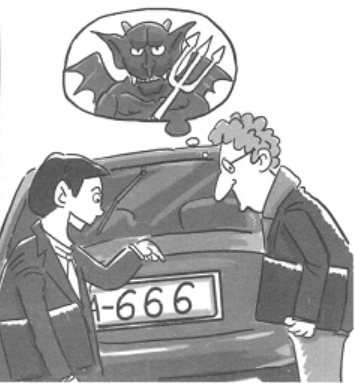In many Western countries, there is often no 13th floor in hotels and residential buildings. Thirteen has been considered an unlucky number for centuries. Additionally, the number 666 has a connection to the devil. Well, the Chinese are superstitious about a few numbers as well.
Four
The number "4" is an unlucky number in Chinese. The word "four" is a homonym for the noun "death" or the verb "to die." Therefore, some Chinese prefer not to live at places that have a number "4" in the address. One of my good local Shanghaiese friends, while house hunting, didn't even want to go inside to look at the beautiful garden of a house that had a number "4" in the street address. She explained to me that her husband would rather live in a house numbered "13" than one numbered "4". By the same token, numbers like "14" and "44" are also inauspicious and avoided. Some hotels in China now don't even have a 44th floor because many Chinese guests would not want to stay on it.
Eight
The number "8", on the other hand, is a very lucky number. It sounds like the word "getting rich" in Chinese, especially in Cantonese. Therefore, businesses love to have the number "8" in any part of their address or phone number. They believe that the usage of the number "8" will actually bring them good luck and prosperity. In fact, people will spend more money to buy phone numbers and license plates that contain "8". So if you see a license plate that has the number "8" for all its numerals, you can be sure the person is a businessman who spent a fortune for it! Similarly, a real estate property with an "8" in its address will be in greater demand.

Six
The number 6 is also a favorable number. It sounds like the word "happiness" in Chinese. When Bryan and I lived in Manhattan, our building address began with "666". Most of our Western friends made fun of us for living at the devil's address. But all of our Chinese friends (and I) thought the address was great. It stood for triple happiness.
Thirty-eight
Beware of the number "38". It is especially problematic when associated with women. In Chinese parlance, "38" or "sanba" is a pejorative for women. It can mean bitchy, bimbo-like, trampy, or shameless depending upon the context. So it is definitely not good for any woman to be called "sanba". Ironically, March 8th, 3/8, is the International Day of Women. It is a day when all Chinese women can take a half day off from work. Stores and restaurants have special bargains for women on that day. I don't know if there is any relationship between March 8th and the pejorative word. Just be sure you make a clear distinction between March 8th the noun and "38" the adjective when you do say the word "sanba" in Chinese.
The Play of Numbers
The interesting thing about numbers in Chinese is that you can easily transform a number into a completely different word by slightly changing its pronunciation. It certainly makes memorizing numbers easier. For example, "1" sounds like the verb "want", "9" is identical to the word "wine" or "liquor". Similarly, the number "5" can sound like the word "I" or "me". And the number "7" sounds like the verb "eat." When combined, the number "57" sounds like the phrase "I eat." There is a clever commercial played in many Shanghai taxis that advertise for a service which makes restaurant recommendations and reservations. The phone number for that service is 57-57-5777. "I eat, I eat, I eat eat eat!"
(selected from 101 Stories for Foreigners to Understand Chinese People by Yi S. Ellis and Bryan D. Ellis, published by China Intercontinental Press in 2012)

